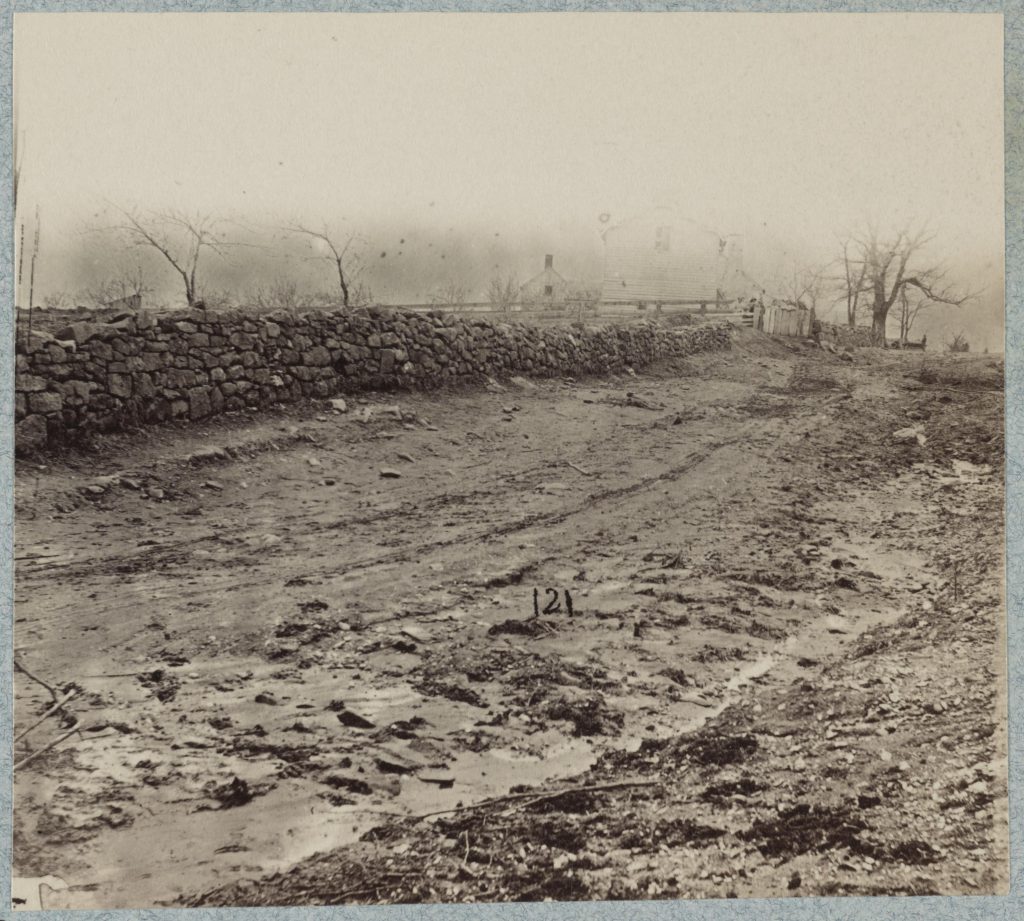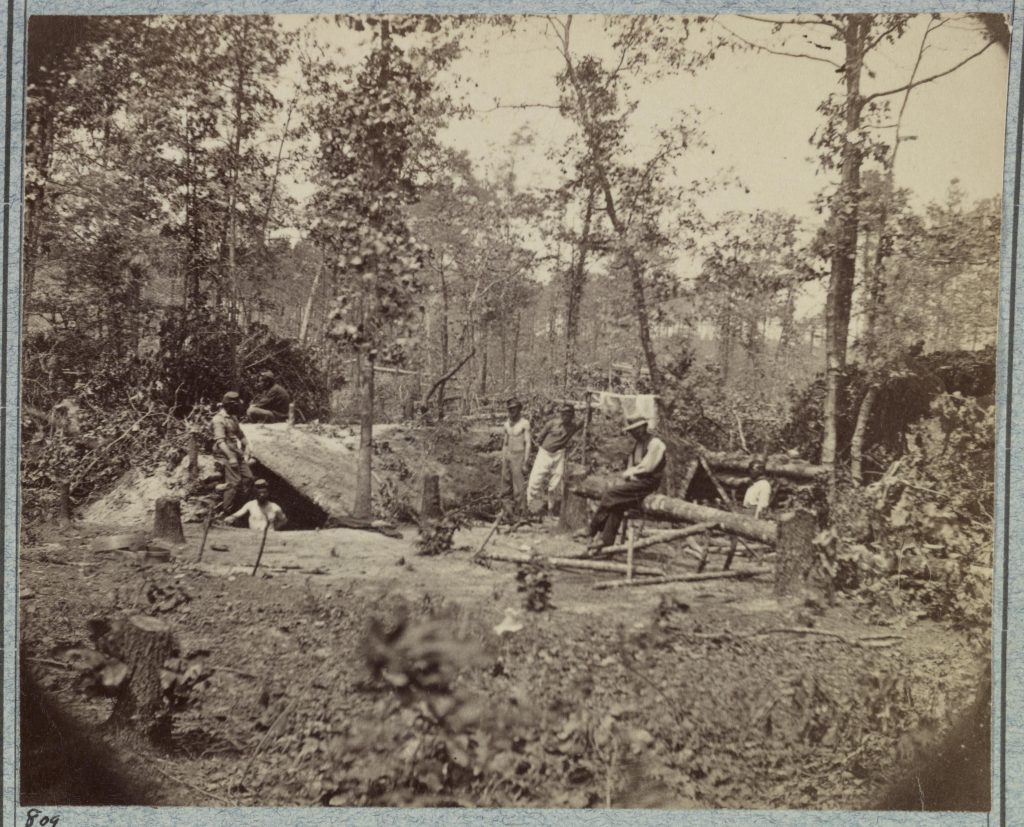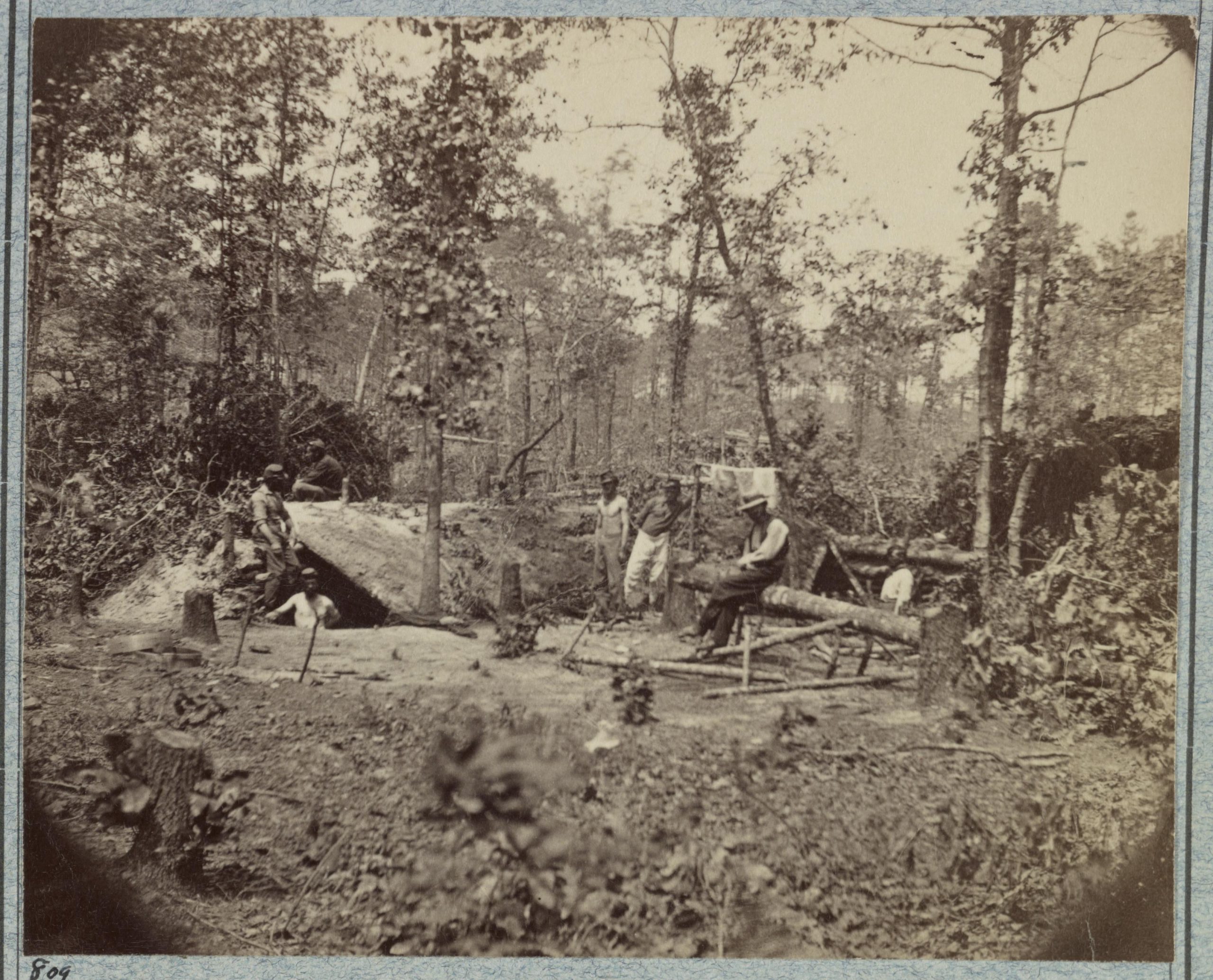Charles Miller was born in 1843 to Ransom Randolph Miller and Francis “Fanny” Maria (Warner) Miller of Gates, New York. In August, 1862, he enlisted in Company D of the 140th New York Infantry, giving his age as 20 instead of 19.
In his collection of 34 letters home on the Research Arsenal, Charles Miller recounts his participation in many battles as well as daily camp life. The letters span nearly his entire length of service, from September, 1862 to April, 1865.
Charles Miller and the Battle of Fredericksburg

After several months guarding Washington, D.C., the 140th New York Infantry saw heavy fighting at the Battle of Fredericksburg, in December, 1862. Charles Miller wrote about his experiences in letter to his parents written on December 22, 1862.
“ As I have little time, I will try and tell you a little of the fight at Fredericksburg.
Thursday the 11th, we left for the march about 4 o’clock in the morning. We traveled nearly 4 miles when we were halted to wait for orders. We had not stopped long before we had to move on so then went on till about one mile from the city where we again stopped at the foot of a hill so that the rebels could not see us. When we got there, our batteries had opened fire upon the city and before long they had it in flames. We lay there nearly two days. At night I went to look at the desolated city as it was in flames. It was a splendid sight to behold.
Saturday morning [13 December] we are still here but it is pretty foggy and the batteries are still. About noon they opened fire from both sides at a horrible rate but our batteries soon silenced their guns as they could not throw their shells over to our batteries. Along in the afternoon, our infantry opened a tremendous fire upon the rebel’s entrenchments. We were then called into line for to cross the river. We left at 4 o’clock and just as we were approaching the pontoon bridge, a shell from one of the rebel batteries burst right in front of our company. It made the boys dodge, I tell you. At last we got across and we marched up one of the streets [and] out on the field of battle with the shells and bullets a flying over our heads.
We were at last ordered to lay down on our arms to be ready at a moment’s warning. We had not been there long when the firing ceased on both sides and we stayed there till next morning when we were ordered back to the city where we stayed two days. The next day I went to look on the field of battle but they did not let us go out of the yard as the rebel sharpshooters would pick our men off as we lay about 200 yards from the field. I could see the dead lying all over the field. I then went into some of the houses and of all the scenes to behold, was in that city. There was not one house in the city, I think, that did not have a cannon ball through it.
At last we were ordered back on the other side of the river in the night. It was raining and it was very muggy. At last we got across and stayed till the next day when we went back to our old camp where we are still. How long we will remain here, I cannot tell.”
Soon after the Battle of Fredericksburg, Charles Miller ran afoul of military law when he was accused of straggling during the Mud March of January, 1863.
The Court Martial of Charles Miller
In a letter written on February 24, 1863, Charles Miller informed his parents that he was still under guard since being apprehended, and told them the course of events that led him to be charged with both straggling and cowardice.
“They still have us under guard in a large tent but we can go anywhere in the regiment but have to have a guard to go with us most of the time. They court-martialed us on the 12th but we have not got our sentences yet but probably will on the next dress parade. They had the charges against us desertion and cowardice but we are not guilty of them charges and so we plead not guilty on them charges but we plead guilty on straggling so we do not know what they will make out of it. But I suppose that you know that they can do as they please or take a notion.
You wanted to know how it happened and all the particulars. I will tell you. On the second march it happened. We left or rather the regiment noon and they had not gone over three or four miles when we stopped in the woods for the night and during the night it commenced raining very hard and continued until nearly night the next day. Early in the morning of the first day the bugle was blown for to fall in and be ready to march at any moment. At last we started on the second day’s march—the mud about one foot deep and besides, in the clay, it would stick to shoes so that it was all that we could do to get along. But we made out to get about three miles and then I had to fall out where we waited for a few moments and then started for a house which we found. We then went into it and stayed nearly two hours. we made some coffee while we was there and after a little while we started off but could not find the direction that the regiment had gone in and so we got lost and that night we lay in the woods and in the morning of the next day we started off again and about noon the cavalry scouts picked us up and took us to their headquarters and kept us two days and then took us to our general’s headquarters where they kept us ten days and then brought us back to our regiment and put us under guard where we are still. I have told you as near as I can about it and I hope that you will not feel bad over it as I could not help it but I hope that it has learned me a lesson that I never will forget.”
The charge of cowardice was dropped, but even in March, the situation was unresolved. Charles Miller wrote another letter home on March 18, 1863 where he revealed, that he had undergone another court martial. “The 13th they gave me another court martial but I think that they cannot make nothing out of it no more than they did before as it did not amount to much.”
Eventually Charles Miller was found guilty of straggling and as punishment was put to work in various locations including Aquia Landing and the Old Capital Prison in Washington, D.C. He seems to have borne the punishment well, and wrote home to his friends about his current duties on May 10, 1863.
“ We are still at Fort No. 2 at work on the boat for our army to retreat on if they should have to retreat from the place. We are still under the same captain of the First Maryland Battery. He is a very fine officer. I suppose that you have heard of the seven days fighting at Fredericksburg and how the cavalry made some very great dashes in the rebel lines. During the fight there was some of the terrible firing of artillery and siege guns that I ever heard. There was one day that we was awaken about half past three to be ready at five o’clock to go to Brooks Station to put up tents for the wounded soldiers which was done with willing hearts. We waited all day there and coming home to our place at night we could see the flash of the heavy guns on the hills at the city.
Along in the afternoon as we was at work, the train came in with a load of wounded—some of them shot in the hand and legs and with their arms broken and some of them shot through the top of the head.”
Less than a week later, on May 16, 1863, Charles wrote home with good news. He had managed to get his sentence commuted and would return to fight with the 140th New York Infantry.
“I suppose you was a little surprised to hear I had been released. Probably you had rather had me remain where I was for the remainder of my time. As for my part, I could not see it in that light. To be sure, there was no danger of my being shot, but the idea of having a dis[honorable] at the expiration of my term of enlistment was what I dislike and which if I obtained I never would have shown myself within the limits of Monroe County. There is no person that can say I am a coward and am afraid to enter a battle. If there is, I want nothing to with that person in anyway if ever I return to my home. If I was a coward, I never would [have] tried as hard as I did to be returned to my command. I not only wrote to the Colonel but to the War Department and had Mr. Wood, the Superintendent of Military Prisoners, to try and do what he could for me. And I must own that it was partly by his influence that I had my sentence commuted.”
Petersburg, Globe Tavern, and Ream’s Station

After returning to the 140th New York Infantry, Charles Miller fought at numerous engagements, including at Petersburg in June and July, 1864. One June 28, 1864 he wrote a letter to his parents datelined from the “Line of Battle before Petersburg, Va.”
“The weather is very pleasant today, it being cooler than for some time past. Last night it rained a little—not enough to make it muddy here as the land is very sandy & the surface will not hold water long. The pickets will keep up a continual fire—also the artillery at intervals. Sometimes they have a duel which lasts probably an half hour & then all is quiet. Last night the mortars were throwing shells all night, some of them bursting high in the air, making a beautiful sight to look upon. We expect to be attacked every evening but they have not up to now. The boys are all in good spirits and ready to meet the enemy at any moment. I rather think we can give them a good trial.”
On July 9, 1864 he wrote again about the fighting around Petersburg.
“Yesterday the artillery kept up a continual fire along our part of the line only at intervals when all would be silent. Between the hours of 4 and five last evening the artillery opened with a rapid fire on both sides. Also there was heavy musketry at the right. As far as I can learn, the Rebels tried to stop some of our forces that were detailed to work throwing up a fort which when finished has a good range of the country for some miles around. They did not succeed in capturing the fort for they were driven back in rather double quick time.
Our line of works are impregnable—also that of the enemy’s. We have a palisade nearly the whole line as well as telegraph wire. The artillery continued their fire at intervals today up to now. Our line advances at some points. The other night was to straighten it a little. The night of the 7th they kept up a continual fire all the night through making it impossible to sleep much.”
On August 26, 1864, Charles Miller wrote home from the “Line of Battle near Ream’s Station,” apprising them of the recent fighting the 140th New York Infantry had been in.
“Our Corps broke camp on the morning of the 18th, it being very pleasant, but after a few hours march, we began to feel the heat of the sun & before reaching the railroad a large number were sun struck. I did not feel very well on arriving there as the sun had such an effect on my head. We took position on the road with but little skirmishing in the forenoon. Immediately after arriving there the First Division commenced their work of destruction by tearing the track up and down & afterwards knocking the ties from off the T. rail & piling them up and putting the soil across the ties, set fire to them, when they became hot enough the heat would bend them nearly double. The Second Division & others forming a line of battle to meet any opposition the enemy might make. Everything went along finely until about noon when a large body of the enemy could be distinctly be seen moving toward us & putting a battery into position. They opened up on workmen with solid shot & shell. But a few well directed shots from our battery knocked them out of position. The Second Division forming on the right of the railroad advanced through a piece of woods where they met the enemy, driving them back. But the Rebels, forming another line, advanced on our right & completely flanking our regiment. We had nothing on our right, being some distance in advance here. We was compelled to retreat or lose all in prisoners.
The boys, however, managed to get through the woods & forming another line was ready to meet the Johnnies, but they did not attack us that night. We held the battleground all that night & a part of the next day. Our loss was very light in the 18th.
On the morning of the 19th we commenced to make our works stronger and part of the works being right on the railroad for our company facing Petersburg between 3 & 4 o’clock in the afternoon. The enemy, throwing a strong force on our right, broke our line and completely flanked us, driving us [illegible]… of the other boys when to my great surprise on looking to the right where the [ ] had his quarters during the day. I seen the Rebel’s colors flying & the first thing I knew a Reb came up with fixed bayonet right on the opposite side of the track [illegible] me prisoner a few moments but [illegible] a chance to escape took to my heals as fast as possible [illegible]. I expect to ever have the privilege of writing to you again on that day when the shells were flying over my head as I was retreating. We fell back & formed a strong line & again advanced & drove the enemy back to their lines. Here we again held the battleground. Our loss was very light in killed and wounded but we lost a large number of prisoners by their flanking us. During all this time it was raining quite hard. I lost the regiment in this excitement & could not find them until the next day.
The 20th we was to work throwing up breastworks all day. At night the order came to close them down and fall back part way across an open field where we again established another line of works. On the morning of the 21st it was my turn to go out on the skirmish line. The order was to advance & draw the enemy from their works if possible. After a little brisk skirmishing, the enemy advanced in a strong line of battle driving us into our works. The ball then opened [illegible] on the left of the railroad, the Johnnies thought they had attacked us on the extreme left but to their great surprise found our line extended a great deal farther than they had any idea of.
G. Warren had marked his batteries at this point & when the enemy had advanced to within a few hundred yards of the pieces they opened upon them with canister, spreading destruction in their ranks. They could withstand the terrible fire no longer. Showing signs of surrender, the batteries was ordered to cease firing which was done. Here we captured a large number of prisoners. This ended the conflict for the day, all but the [illegible] which kept up a continual fire all the afternoon.
Yesterday the enemy as far as I can learn attacked Hancock on our left. They charged three times & were badly defeated with heavy loss. Our Corps held itself in readiness for an attack at any point the enemy should attempt to break through.”
Charles Miller continued to serve in the 140th New York Infantry through the end of the war. He mustered out with his company on June 3, 1865. He was twice married. First, to Harriet A. Hart (1851-1922) and second to Salina Mae Hinton (1858-1921.) Charles Miller died in 1912.
To read more of Charles Miller’s letters as well as access thousands of other Civil War letters and documents, sign up for a Research Arsenal membership.
We’d like to give a special thanks to William Griffing of Spared & Shared for his work in sharing and transcribing these letters.
To read more about some of our many featured collections, check out the articles on Cornelius Van Houten of the 1st New Jersey Light Artillery and Albert Jenkins Barnard of the 116th New York Infantry.


